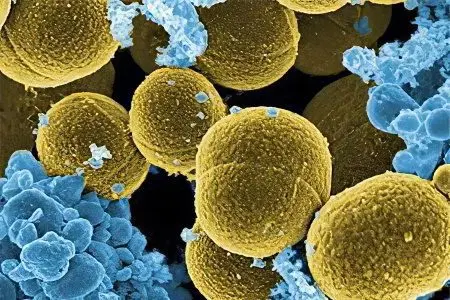Contents

Bacterial prostatitis is an infectious disease of the prostate gland, which has an acute or chronic course. An acute inflammatory reaction is manifested by severe pain in the perineum, an increase in body temperature to high values, intoxication of the body and other symptoms. Such a condition of the patient requires emergency hospitalization, as it can pose a threat to the health and life of the patient.
According to data provided by the National Institutes of Health, bacterial prostatitis is uncommon and accounts for an average of 5% of all cases of prostatitis. The disease affects men aged 25 to 50 years at a time when their sexual activity is at a high level.
The National American Institutes of Health classifies acute bacterial prostatitis as the first category of four types of prostatitis.
Causes of bacterial prostatitis
The causes of bacterial prostatitis lie in the penetration of pathogenic agents into the prostate gland of a man, since a healthy organ is free from any microorganisms.
Infectious agents that cause acute inflammation are the following microorganisms:
Staphylococcus;
Enterobacter;
Enterococcus;
Pseudomonas aeruginosa;
Proteus;
E. coli, which causes the development of acute bacterial prostatitis in 65-80% of cases;
Klebsiella.
The vast majority of these microorganisms are conditionally pathogenic for humans and can lead to the development of prostatitis only if there are predisposing factors for this.
These include:
Phimosis.
Anal-genital intercourse without a condom.
Urinary tract infections.
Urethral catheterization on an ongoing basis.
Transurethral surgery performed without previous antibiotic therapy.
Acute epididymitis.
Violation of the process of urination caused by anatomical abnormalities of the bladder neck.
Urethroprostatic and intraprostatic reflux with the entry of bacterial flora into the prostate ducts. In this case, the following three factors must be present: the presence of pathogenic bacteria directly in the urethra, or in the urinary tract, organic or functional obstruction of the urinary tract, the presence of any form of duct reflux.
Immunosuppressive conditions (diabetes mellitus, AIDS, hemodialysis, etc.).
Urethral strictures.
Difficulty urinating on the background of prostate adenoma.
Other bacterial infections of the body, in which pathogenic agents penetrate the prostate gland by lymphatic and hematogenous routes.
After the bacteria enter the prostate gland, an inflammatory infiltrate is formed in the organ, with the involvement of the stroma and epithelium, which is responsible for the production of prostate secretion, in the process. As a result, the exudate becomes more viscous, lingers longer in the lumen of the glands. The existing bacterial flora begins to actively multiply, which causes the progression of the inflammatory process.
Symptoms of bacterial prostatitis

Symptoms of bacterial prostatitis most often begin acutely, so it is impossible not to notice the manifestation of the disease.
The following clinical picture is typical:
Fever with chills.
Increase in body temperature. At the same time, the temperature measured in the armpit can reach low levels, and the body temperature measured in the anus will be much higher. The difference can reach 0,5 degrees.
Pain in the lower back, in the lower abdomen, in the perineum. Possible irradiation of pain in the pelvis, inguinal zone, in the scrotum, in the anus.
Urination becomes frequent, painful. This is especially disturbing for the patient at night. During the emptying of the bladder, pain occurs, a burning sensation along the urethra.
Sometimes urination, on the contrary, becomes difficult. Complete retention of urine is possible.
Due to compression of the anus by the enlarged prostate gland, constipation may develop, as well as the occurrence of severe pain during bowel movements.
The general intoxication of the body, headache, there is a feeling of insurmountable weakness and weakness. Aches in muscles, bones and joints may appear.
It is not excluded discharge from the urethra of secretions of various colors, from colorless to yellowish-green. In addition, blood impurities in the semen are possible.
You should also consider the symptoms of bacterial prostatitis, depending on the stage of the course of the disease:
For the first stage, which is called catarrhal, only the ducts of the prostate gland are involved in the inflammatory process. The patient experiences pain in the perineum with irradiation to the sacrum. Perhaps painful urination, which becomes somewhat more frequent.
For the second stage, which is called follicular (there is a lesion of the prostate lobules), is characterized by increased pain with irradiation to the anus. Urination is difficult, urine comes out in a thin stream, up to the complete retention of the biological fluid. The temperature is kept at subfebrile levels.
The third stage, which is called parenchymal, is characterized by the involvement in the pathological process of both lobules of the organ with inflammation of the gland tissue. At the same time, the man suffers from severe intoxication of the body with an increase in body temperature up to 40 ° C. There is an acute urinary retention, sharp throbbing pain in the perineum, severe constipation.
Complications of bacterial prostatitis
Complications of bacterial prostatitis with untimely medical care can be quite serious and threaten the life of the patient. The most dangerous complication is sepsis, when a person often dies against the background of blood poisoning.
It is possible that the infection will rise from the prostate above and provoke the development of pyelonephritis and cystitis.
It is possible that bacterial prostatitis will turn into chronic, which is difficult to treat and causes many health problems, including infertility, prostate adenoma, impotence, etc.
Lack of therapy also threatens the development of prostate abscess. If a purulent focus is formed, then this increases the body temperature to hectic levels. Rarely, but there is a spontaneous opening of an abscess with the release of purulent masses into the rectum or urethra. In this case, the urine acquires a sharp unpleasant odor, pus and mucus are present in the feces.
Since the complications of bacterial prostatitis are life-threatening, with the risk of their accession, the patient must be hospitalized without fail.
Diagnosis of bacterial prostatitis

Diagnosis of bacterial prostatitis, as a rule, is not complicated, as patients present with characteristic complaints. A rectal examination of the prostate is performed if bacterial prostatitis is not acute. In this case, the doctor gently probes the prostate and takes the secret of the prostate gland. Subsequently, the collected material is sent for bacterial culture. In addition, a bacterial culture of the urine is required. This will identify the bacterial agent that led to inflammation and determine its sensitivity to drugs.
A contraindication to digital rectal examination is acute bacterial prostatitis with high body temperature and general intoxication of the body, since there is a risk of infection spreading through the blood and the development of sepsis. In addition, often it is simply physically impossible, as the patient experiences severe pain.
In this case, such research methods help to make a diagnosis, such as:
Clinical blood test;
Analysis of urine;
Urine culture;
Scraping of the epithelium of the urethra, which is sent to the laboratory for PCR testing;
Blood PSA to differentiate bacterial prostatitis from prostate cancer.
Ultrasound examination of the prostate is necessary for a more detailed study of structural changes in the prostate gland. It is carried out after the elimination of acute inflammation.
Treatment of bacterial prostatitis
Treatment of bacterial prostatitis requires antibiotic therapy, which must be carried out without fail. Antibiotics are prescribed for acute and chronic bacterial prostatitis, since it will not be possible to get rid of the disease in other ways.
There is no universal antibacterial agent for the treatment of bacterial prostatitis. The drug is selected based on the sensitivity of a particular microorganism that provoked inflammation. Only a urologist or andrologist can correctly select a drug, determine its dosage, and set specific terms of treatment. Self-therapy is unacceptable.
The average course of treatment is 4-8 weeks. In this case, the therapy should be complex, it includes taking antibiotics, NSAIDs, immunostimulating drugs, vitamin therapy. It is possible that a man will need to take antidepressants and sedatives.
If acute bacterial prostatitis is mild and there is no threat of complications, outpatient treatment is possible. With severe intoxication, as well as if there is a suspicion of a purulent process, hospitalization is mandatory. In this case, the issue of intravenous administration of antibacterial drugs is considered.
With regard to the choice of a specific antibiotic, it is possible to use the following drugs:
Fluoroquinolonesto which most bacteria are sensitive. However, these drugs have a number of side effects characteristic of antibiotics, as well as phototoxicity and neurotoxicity. They can be prescribed only if the doctor is 100% sure that there is no tubercle bacillus in the patient’s body.
Tetracyclines in recent years, they are used quite rarely, as they are difficult to tolerate.
Penicillins. The most effective drugs in this group are protected penicillins.
Cephalosporins – drugs for intramuscular injection, prescribed in the acute phase of bacterial prostatitis.
Macrolides for the treatment of bacterial prostatitis is rarely prescribed, since there are no data on the use of drugs of this group for the treatment of this disease. At the same time, these drugs are highly active against many bacteria, so their appointment is not excluded.
Often, doctors use several antibiotic drugs to treat acute bacterial prostatitis at once, which makes it possible to optimize the treatment regimen and quickly relieve the patient of inflammation. In addition to the appointment of conservative therapy, the patient is shown complete rest with bed rest. Analgesics and antipyretics are prescribed depending on the symptoms of the disease.
The patient must comply with the drinking regimen, since profuse urination is a preventive measure in terms of the development of an ascending infection. It also allows you to quickly remove intoxication. Patients with acute urinary retention are shown catheterization of the bladder. To relax the muscles of the pelvic floor, drugs such as Diazepam, Baclofen, Gabapentin, Pregabalin are used.
Massage, any thermal procedures of the prostate area, androgen intake during acute bacterial prostatitis are strictly prohibited. This greatly increases the risk of developing sepsis.
The prognosis for recovery without any health consequences is quite favorable. In some cases, chronicization of the process is possible, which most often occurs with incorrect or inadequate treatment. The same applies to all possible complications of the disease.









